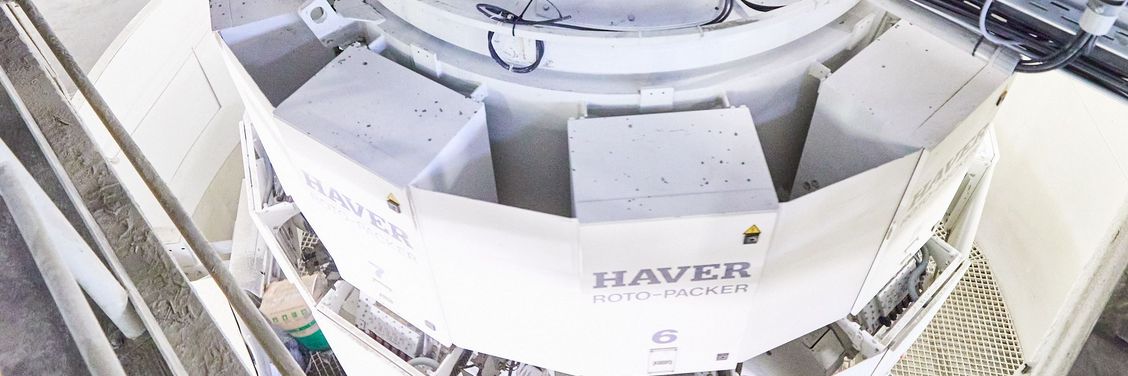Energy efficiency and energy savings: One of the most significant challenges of our time in companies in all sectors all over the world. Based on global developments, the economic use of energy has long since gone from a committed goal to an unavoidable necessity. Sustainability and climate protection are of existential importance, exploding energy costs are exacerbating economic considerations, and the recognition of social responsibility by each individual is rising.
The packing specialists at the HAVER & BOECKER Machinery Division and BEHN + BATES have always attached great importance to developing and exploiting a wide range of potential savings. “Through comprehensive process optimization along the entire value-adding chain, considerable savings can be made without compromising on performance, weight accuracy and cleanliness,” explains Guido Neu, Area Sales Manager in the Cement Division. Lower consumption and more energy efficiency in production and beyond can often be achieved with minimal effort for customers in the chemical, cement, building materials, food and animal feed industries. “Our approaches range from pure service measures for process optimization, to the modernization and retrofitting of existing systems, and including the optimization of control systems, the targeted acquisition of new packing technology, packaging materials or automation technology.”
High performance for maximum results
One of the key factors for maximum energy efficiency in production is the optimization of machine performance and operational availability. “A system that runs at full capacity with a consistently high output, optimum weight accuracy and as little downtime as possible saves energy and money,” summarizes Daniel Denisow, Sales Manager in the Chemical division. The energy consumption per filled bag is reduced - and therefore also the costs per packed ton of the customer’s valuable product. Such high efficiency is achieved through a wide variety of approaches. One of the key words is needs-based automation: from the fully automatic bag placer, to the palletizer and all downstream processes like logistics. Professionally automated processes guarantee maximum performance.
“If the system is not fully utilized, too much energy is wasted if only some of the filling spouts are in operation and a certain baseload energy requirement is still needed, for example for de-dusting and bag transport,” Denisow emphasizes. Within the scope of a service call, the specialists from HAVER & BOECKER can identify inefficient processes and specific optimization potential and initiate targeted measures in consultation with the customer. In addition to the best possible adjustment of the system and the precise coordination of all auxiliary units, this also includes ensuring uninterrupted operational availability and supply of consumables.
More safety, less downtime
Continuous monitoring and preventive maintenance play an important role in minimizing packing line downtime. With the digital tools from HAVER & BOECKER and BEHN + BATES, such as QUAT²RO® System Monitoring, the production process and maintenance status can be monitored and analyzed at any time and from anywhere in the world. Irregularities such as reduced output are thus quickly detected and can be rectified without losing a lot of time. The system's performance data, which is available at all times, also enables early detection and scheduling of upcoming maintenance: Instead of sudden, lengthy and expensive breakdowns, maintenance and servicing work can be optimally planned and integrated into the operating process. The seamless monitoring of the production process also creates the conditions for further savings. “The automatic shutdown of peripheral systems, for example, offers considerable energy savings and is easy to implement with our modern programs,” explains Andreas Hansow, system specialist in HAVER Service Support. “When the automatic bag placer is stopped, for example, no packing machine, no compressed air, no material return, no dust extraction and no palletizer are required and should be switched off promptly.”
Smart tools from QUAT²RO, another member of the HAVER & BOECKER Group, such as the production management system QUAT2RO Production, the batch management system QUAT2RO Batch or the dispatch automation system QUAT2RO Logistics, also ensure efficiently coordinated process management. If all components and processes are available at the right place and at the right time, the greatest possible results can be achieved with the lowest possible energy consumption.
Using resources cleverly instead of wasting them
The waste of valuable materials is also associated with unnecessarily high energy consumption, says Michael Mestekemper, Deputy Head of the Building Materials and Minerals Division: “If material waste is reduced to a minimum through clean, weight-accurate filling technology, efficient material recirculation using return screws, and ideal protection of the filled product, then less material also needs to be produced.” Innovative solutions for clean filling in the HAVER & BOECKER product range include the patented ROTO-LOCK® dosing unit, the new ROTO-FEED® silo filling system and the pioneering SEAL technology.
Less material spillage not only results in the best possible use of the expensive product and a clean, healthy work environment, but also creates further benefits through reduced wear and tear, maintenance and cleaning requirements for the systems.
The switch to ADAMS® technology for filling powdery, bulk materials into compact, secure FFS film bags made from recyclable PE also helps to save energy. The particularly compact filled bags protect the bulk material 100% from moisture in the air. They can be stacked to save space and stored outdoors if required: from the empty bags to the filled package, storage costs and space can be reduced and freight costs optimized.
Last but not least, energy can be saved effectively by directly reducing electricity consumption in production. Mestekemper explains: “For example, it is worth checking the actual drive sizes required for the systems: A smaller, more economical motor with less power may be sufficient. A frequency converter that adapts the motor speed to the specific requirements of the respective application can also achieve drastic energy savings in many areas.”
Whether servicing or upgrading, control system adaptation or new acquisition, the specialists at HAVER & BOECKER are on hand with customized solutions and great expertise.




